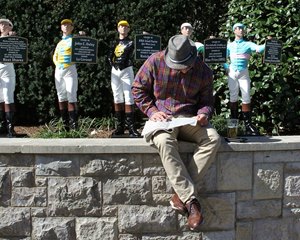Symposium: Cummings Advocates for Bettors


Patrick Cummings, executive director of the fledgling Thoroughbred Idea Foundation, has a long list of initiatives.
The issues within the racing industry identified by the organization (which began operations in August) are numerous, but at the University of Arizona's Global Symposium on Racing Dec. 5 in Tucson, Ariz., Cummings focused on two points—breakage and the way races are officiated in North America.
In a panel titled "The Value of Supporting Racing's Core Product and Players," Cummings targeted the elimination of breakage, or the rounding down of pari-mutuel payoffs, which in North America is most commonly rounded down to 10-cent increments, but can vary depending on the jurisdiction.

With that leftover change not going to bettors, it not only impacts horseplayers' bottom line, but also cuts into churn.
"(Breakage) has gone essentially unchallenged for the better part of nine decades," Cummings said. "The whole industry can price our product better, stimulate the tote pools, and ... treat racing's core players with respect. (Eliminating breakage would) stimulate the market by giving the players the change they duly deserve. The purposes for that retention are no longer necessary."
Among a number of slides presented to support his cause was a tally of the win-pool breakage lost by bettors during the 2018 Triple Crown races. The total presented was more than $1 million, which increased the effective takeout (compared with the published takeout) on the Preakness Stakes (G1) and Belmont Stakes (G1) by more than 2%.
"In the last 15 years, handle in North American racing is down 48% (when) adjusted for inflation," Cummings said. "I would suggest we haven't been working for our customers, because our business is not growing. ... The most fundamental thing the industry should be doing is supporting its core players and its core products. ... (Money lost by bettors through breakage) is money that cannot be put back into the system."
Cummings also railed on race-timing issues in the U.S. during the discussion and called issues over track's declared course conditions (like when the Breeders' Cup turf condition this year at Churchill Downs was listed as "good," despite the heavy rains that caused many to doubt that distinction) an "embarrassment."
"I don't think enough racetrack operators are taking their role seriously enough to be able to present data and products that go together," he said.
Steve Byk, who hosts the radio show At the Races with Steve Byk, moderated the discussion and similarly criticized what he felt was the industry's neglect of the customer.
"(The industry) is now facing real competition for the first time, and let's be honest, we've squandered the unique opportunity we had as the only place on the internet to make a wager. ... Now there's real competition (from sports betting), and to be honest, it feels like we're woefully unprepared," Byk said. "Because we haven't even taken care of the most important customers that we have. The internet came along and the opportunity for players—people who really enjoy the game, and want to bet, and want to spend their money—they're communicating their dissatisfaction, and we're unresponsive as an industry."
In another panel titled "Consistency, Transparency, and Competitive Racing," Cummings advocated for a fundamental change in the rules over disqualifications for in-race riding infractions, which would move North America into line with the most of the rest of the world.
BALAN: Differing DQ Standards on Display at Symposium
He also called for increased transparency from stewards in North America, with the goal of attaining the betting public's trust.
"There is a need for stewards and racing stakeholders to communicate better," Cummings said. "The way in which stewards treat bettors needs to improve. I look at Churchill Downs on Thanksgiving weekend. There was a three-horse photo, (with) the first two horses paying in the jackpot Pick 6 bet and the third-place horse was not—a carryover horse.
"There was a double disqualification (which created a carryover of the jackpot pool) and the immediate response from horseplayers was conspiracy. ... That's absolutely ludicrous. There's no chance of that. But the perception—that the players would come to that belief immediately—is a sign that something is broken."
Cummings stressed urgency on these issues and warned, if they are not addressed, pari-mutuel handle will not significantly grow
"We have a couple issues we're advocating for, but get out there and make changes," he said. "The status quo is untenable for this sport for the future. Start making those changes now."
